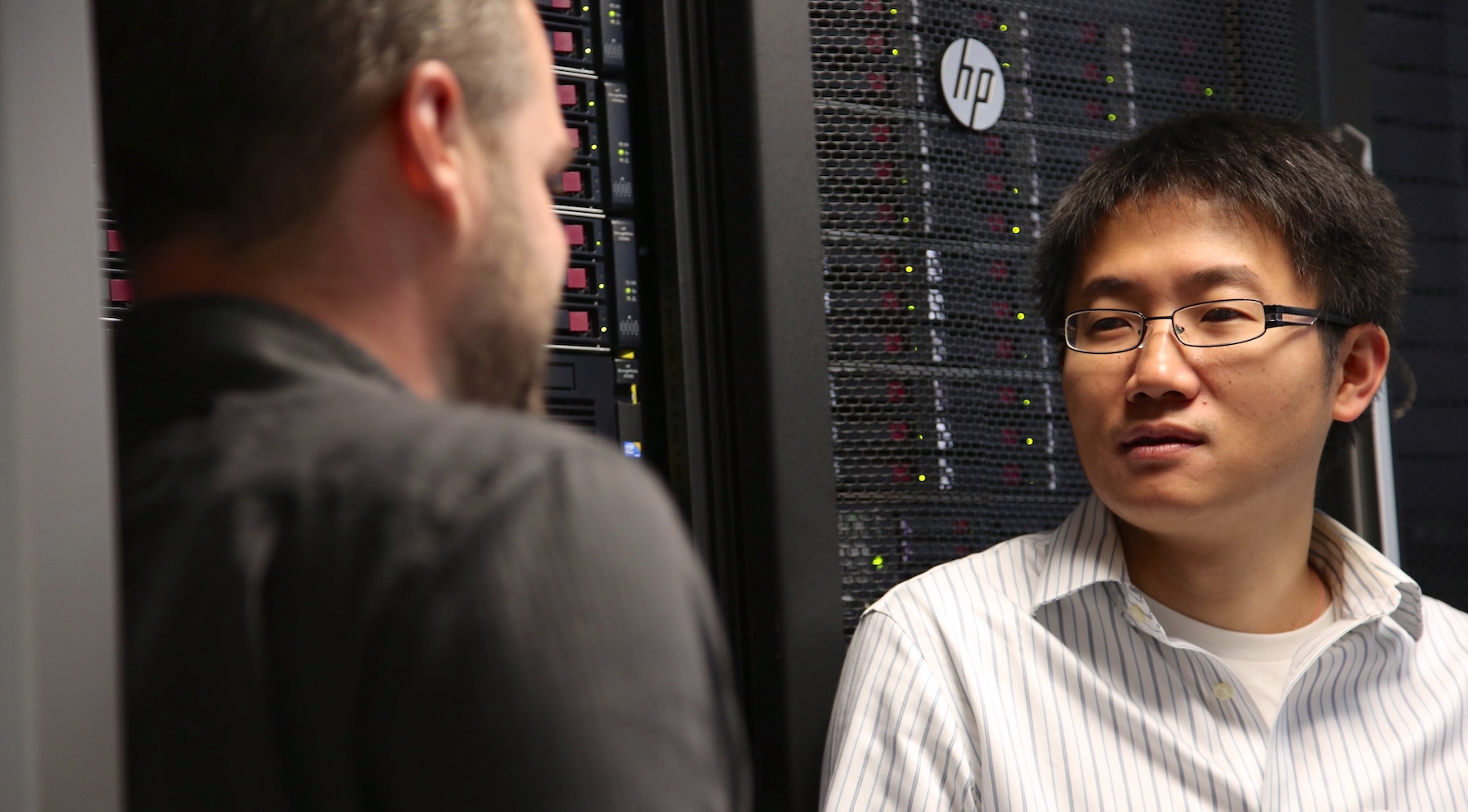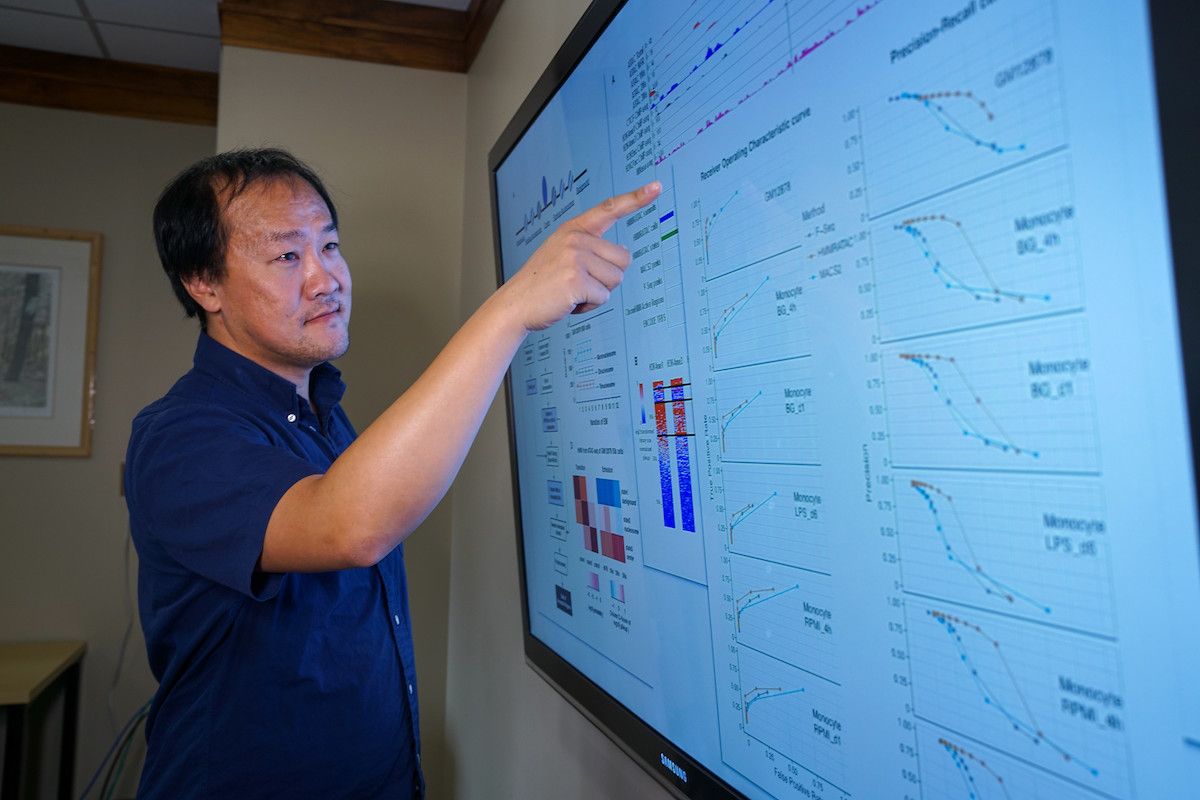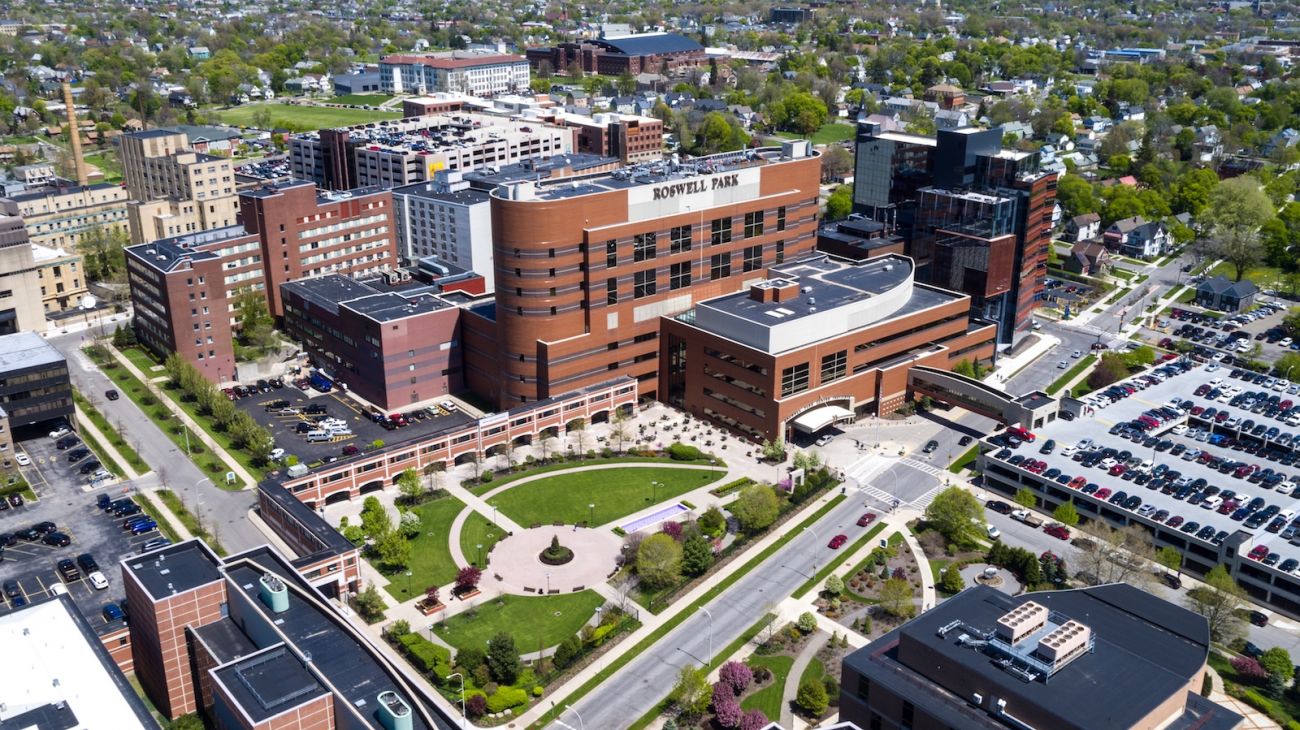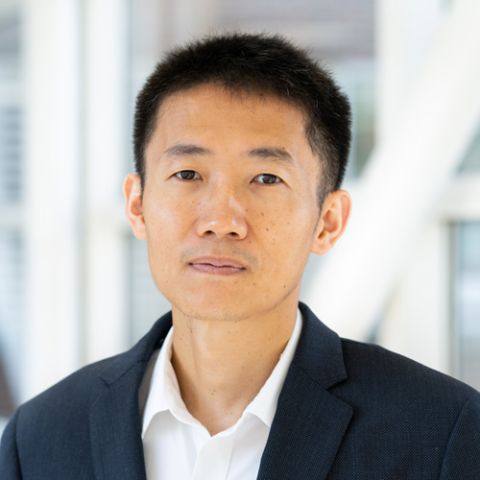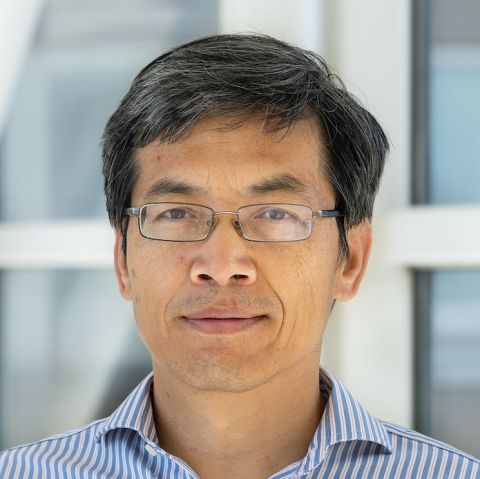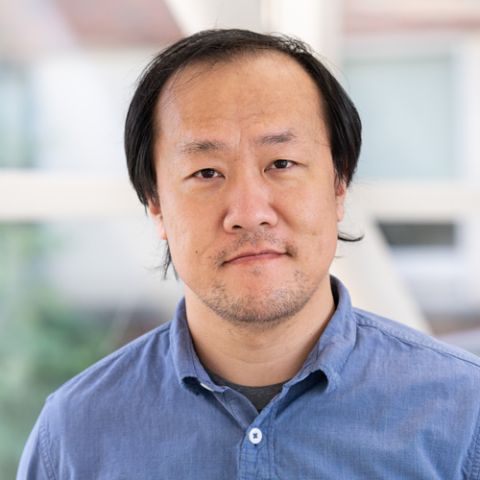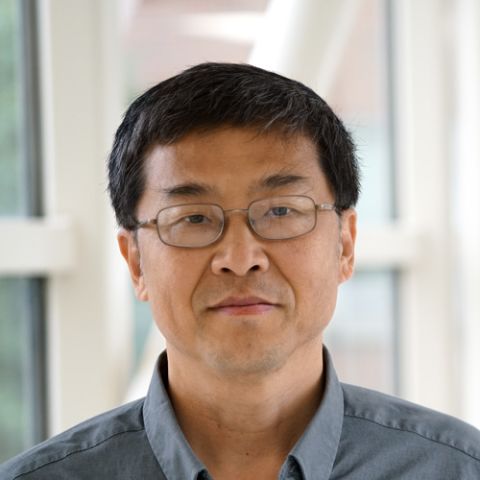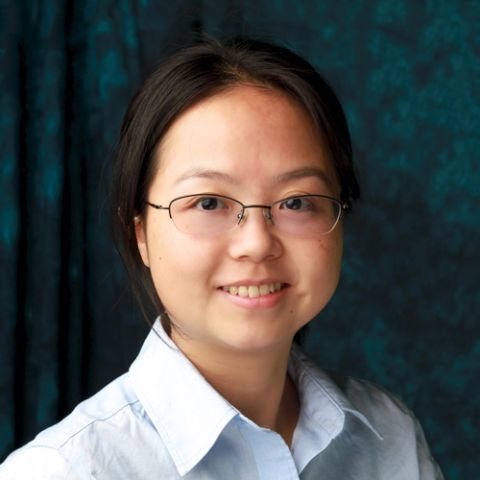What we do
The Bioinformatics Shared Resource (BIOINF) at Roswell Park Comprehensive Cancer Center provides state-of-the-art bioinformatics assistance for the design, analysis and interpretation of genomics, proteomics and other high-resolution, high-throughput-based studies for better understanding of cancer biology, thereby facilitating translation of cancer omics discoveries to cancer treatment.
We direct the design of high-throughput experiments, raw omics data processing, data analysis and interpretation, data mining and integration, assist in the design and deployment of appropriate informatics infrastructure for data sharing and management, review and prepare grants and manuscripts, software evaluation, new method and database development, and provide bioinformatics education and hands-on training for investigators. Our expertise ensures that the yield of useful information from the scientific studies conducted at Roswell Park is maximized while costs are minimized.
Working in partnership with the Biostatistics and Statistical Genomics Shared Resource, we coordinate service and support activities through regular planning meetings, ensuring that Cancer Center Support Grant (CCSG) investigators have full analytic coverage from clinical and preclinical biostatistics to statistical genetics and translational bioinformatics, while receiving focused support on each discipline. In addition, the Resource has developed a synergistic working relationship with the Genomics, Biomedical Research Informatics, Biorepository and Laboratory Services Shared Resources and the Information Technology department to ensure coordination of experiment and analytics through the different phases of a cancer research project.
Technology
The Bioinformatics Shared Resource takes advantage of two state-of-the-art and locally available computing resources necessary to provide high-level bioinformatics support.
First, we acquired a high-performance computing cluster through the Rowell Park Information Technology (IT) department. This cluster is specifically designed to support the development of targeted medical therapies tailored to a cancer patient's unique genetic characteristics using various next-generation sequence (NGS) applications on both single cell and cells in bulk levels.
Second, Shared Resource personnel have ready access to the high-performance computing cluster with more than 2PFlop/s of peak performance compute capacity and accompanying high-performance storage thanks to a formal collaboration with the Center for Computational Research (CCR) at the State University of New York at Buffalo (UB). The CCR is a leading academic supercomputing facility with a high-performance computing environment, state-of-the-art visualization laboratories and support staff with expertise in computing, visualization and networking.
These high-performance computing resources are ideal for bioinformatics services at various scale of compute-intensity. A list of up-to-date bioinformatics software and database used and/or developed by the Shared Resource team for support and service are installed and maintained on these computing systems.
Bioinformatics services
Open Project Design configuration options
The overall goal of the Bioinformatics Shared Resource is to provide comprehensive bioinformatics services to the CCSG research programs through the different phases of a cancer research project. Our staff assist researchers in conducting high-throughput experiments. These experiments are guided by computational insights and designed to ensure that the correct bioinformatics analysis plans are developed in relevant grant and protocol development and ultimately employed in subsequent manuscript preparations.
Our staff work closely with principal investigators and other members of the research team to define the nature and scope of relevant bioinformatics needs, as well as the type(s) of omics data to be collected and analyzed to achieve the study objectives. This includes detailed discussion on the hypothesis of interest, preliminary data-mining strategies using public data repositories, consideration of the appropriate high-throughput techniques, employment of the optimal experiment design scheme, and anticipated limitations of the data.
We provide exploratory data-mining support for the development of the preliminary data section. We review — and, in general, develop — the bioinformatics analysis plan for the majority of CCSG and Roswell Park grant applications.
We perform bioinformatics analysis and data mining of various omics and other biological datasets. We assist investigators with the integration of omics data with clinical information and develop analytical models for these data based on the hypothesis of interest.
We provide well-established data processing, visualization and analysis pipelines and workflows for various multi-omics and imaging applications at both single cells and cells in bulk levels.
Bioinformatics personnel also perform in silico analysis (such as pathway and function enrichment analysis, and gene network analysis) and assist investigators with finding plausible biological and/or clinical interpretations of their respective results.
Our team, serving as scientific collaborators, review and write the bioinformatics analysis section of the manuscript of interest and provide the relevant interpretation of the data models as they relate to the conclusions presented in the given manuscript.
We provide a range of educational opportunities to students, fellows, research staff and faculty. These include hands-on workshops, one-on-one consultations, lectures, seminars, webinars and courses on topics such as study design, analysis methods and workflow implementation.
We contribute to the development of the underlying informatics infrastructure in close collaboration with the IT department in order to provide CCSG investigators with access to data warehousing and computing resources for storing, managing, analyzing and sharing omics data and other types of data. Members of our staff serve on the IT Advisory Board, where they make recommendations on key data management and computer system infrastructure. It is critical that they participate in decision making in order to ensure the right data in the correct format flows into the appropriate data repositories.
The Bioinformatics Shared Resource personnel collect and test available bioinformatics products in order to help investigators select the appropriate tools for their specific studies.
The Bioinformatics Shared Resource team develops customized bioinformatics tools, interactive web applications and underlying back-end databases, as necessary, when existing products are unavailable or do not meet the customized needs of CCSG investigators relative to answering specific study objectives. Whenever possible, we make these tools available to the broader cancer research community.
Location and hours
Roswell Park Comprehensive Cancer CenterBioinformatics Shared Resource
Research Study Center – 4th Floor
Elm and Carlton Streets
Buffalo, New York 14263
Operating schedule
Monday - Friday, 8 a.m. - 5 p.m.
This shared resource is funded by NCI P30CA16056. Publications should cite the Core grant in the acknowledgment section, if publications use data generated by the shared resource. Two copies of the publication acknowledging the Core grant should also be submitted to the facility at Elm & Carlton Streets, Buffalo, NY 14263.
The Bioinformatics Shared Resource supports the research needs of Roswell Park investigators with respect to experimental design, data integration, as well as data analysis of clinical, laboratory and population-based studies utilizing high-throughput bioinformatics technologies. Our mission is to advance cancer research and cancer treatment by providing an array of bioinformatics, shared research and services to the institute community through collaboration. A key expertise is to develop and utilize state-of-the-art bioinformatics algorithms to design, analyze and integrate various voluminous “-omics” data for a better understanding of the molecular mechanisms underlying human cancer initiation, progression and prognosis.
The Bioinformatics Shared Resource takes advantage of several major computing resources available. First, each employee has a Dell Linux workstation, which is ideal for moderately compute-intensive bioinformatics projects. Second, through collaboration with the Roswell Park IT department, the team has a high-performance computing cluster suitable for next-generation sequencing analysis. Third, through collaboration with the Center for Computational Research at UB, resource staff has ready access to the high-performance computing cluster. These high-performance computing cluster resources are specifically designed for compute-intensive projects.
The Bioinformatics Shared Resource will develop novel and effective bioinformatics tools for research and clinical applications, assist researchers to perform high-throughput “omic” experiments guided by computational insights, ensure the correct bioinformatics design and analysis methodologies are employed in relevant Roswell Park grant and manuscript preparations.
Meet our team
Faculty
Staff
Eduardo Cortes, MA
Senior Bioinformatician
Phone: 716-845-6313
Email: Eduardo.CortesGomez@RoswellPark.org
Qiang Hu, PhD
Senior Bioinformatician
Phone: 716-845-1630
Email: Qiang.Hu@RoswellPark.org
Ram Nambiar, MS
Programmer/Analyst
Phone: 716-845-1300, x2216
Email: Ram.Nambiar@RoswellPark.org
Yali Zhang, MPH
Senior Bioinformatician
Phone: 716-845-2274
Email: Yali.Zhang@RoswellPark.org
Publications
- Fungal mycobiome drives IL-33 secretion and type 2 immunity in pancreatic cancer. Alam A, Levanduski E, Denz P, Villavicencio HS, Bhatta M, Alhorebi L, Zhang Y, Gomez EC, Morreale B, Senchanthisai S, Li J, Turowski SG, Sexton S, Sait SJ, Singh PK, Wang J, Maitra A, Kalinski P, DePinho RA, Wang H, Liao W, Abrams SI, Segal BH, Dey P. Cancer Cell. 2022;40(2):153-167.e11.
- A mitochondrial unfolded protein response inhibitor suppresses prostate cancer growth in mice via HSP60. Kumar R, Chaudhary AK, Woytash J, Inigo JR, Gokhale AA, Bshara W, Attwood K, Wang J, Spernyak JA, Rath E, Yadav N, Haller D, Goodrich DW, Tang DG, Chandra D. J Clin Invest. 2022;132(13):e149906.
- Understanding Drug Sensitivity and Tackling Resistance in Cancer. Tyner JW, Haderk F, Kumaraswamy A, Baughn LB, Van Ness BG, Liu S, Marathe H, Alumkal JJ, Bivona TG, Chan KS, Druker BJ, Hutson AD, Nelson PS, Sawyers CL, Willey CD. Cancer Research 2022;82(8):1448-1460.
- Deciphering spatial genomic heterogeneity at a single cell resolution in multiple myeloma. Merz M, Merz AMA, Wang J, Wei L, Hu Q, Hutson N, Rondeau C, Celotto K, Belal A, Alberico R, Block AW, Mohammadpour H, Wallace PK, Tario J, Luce J, Glenn ST, Singh P, Herr MM, Hahn T, Samur M, Munshi N, Liu S, McCarthy PL, Hillengass J. Nature Communications 2022;13(1):807.
- Metabolic adaptation of ovarian tumors in patients treated with an IDO1 inhibitor constrains antitumor immune responses. Odunsi K, Qian F, Lugade AA, Yu H, Geller MA, Fling SP, Kaiser JC, Lacroix AM, D'Amico L, Ramchurren N, Morishima C, Disis ML, Dennis L, Danaher P, Warren S, Nguyen VA, Ravi S, Tsuji T, Rosario S, Zha W, Hutson A, Liu S, Lele S, Zsiros E, McGray AJR, Chiello J, Koya R, Chodon T, Morrison CD, Putluri V, Putluri N, Mager DE, Gunawan R, Cheever MA, Battaglia S, Matsuzaki J. Science Translational Medicine. 2022;14(636):eabg8402.
- UACA locus is associated with breast cancer chemoresistance and survival. Zhu Q, Schultz E, Long J, Roh JM, Valice E, Laurent CA, Radimer KH, Yan L, Ergas IJ, Davis W, Ranatunga D, Gandhi S, Kwan ML, Bao PP, Zheng W, Shu XO, Ambrosone C, Yao S, Kushi LH. NPJ Breast Cancer. 2022;8(1):39.
- Generation of cDC-like cells from human induced pluripotent stem cells via Notch signaling. Makino K, Long MD, Kajihara R, Matsueda S, Oba T, Kanehira K, Liu S, Ito F. Journal for ImmunoTherapy of Cancer 2022;10(1):e003827.
- Recurrent Frameshift Neoantigen Vaccine Elicits Protective Immunity with Reduced Tumor Burden and Improved Overall Survival in a Lynch Syndrome Mouse Model. Gebert J, Gelincik O, Oezcan-Wahlbrink M, Marshall JD, Hernandez-Sanchez A, Urban K, Long M, Cortes E, Tosti E, Katzenmaier EM, Song Y, Elsaadi A, Deng N, Vilar E, Fuchs V, Nelius N, Yuan YP, Ahadova A, Sei S, Shoemaker RH, Umar A, Wei L, Liu S, Bork P, Edelmann W, von Knebel Doeberitz M, Lipkin SM, Kloor M. Gastroenterology. Gastroenterology. 2021 Oct;161(4):1288-1302.e13.
- CD8+ T cell immunity blocks the metastasis of carcinogen-exposed breast cancer. Li K, Li T, Feng Z, Huang M, Wei L, Yan Z, Long M, Hu Q, Wang J, Liu S, Sgroi DC, Demehri S. Science Advances 2021 Jun 18;7(25):eabd8936.
- Bioconductor toolchain for reproducible bioinformatics pipelines using Rcwl and RcwlPipelines. Hu Q, Hutson A, Liu S, Morgan M, Liu Q. Bioinformatics. 2021 Mar 27;37(19):3351-2.
- Sun X, Zhang Y, Li J, Soo Park K, Han K, Zhou X, Xu Y, Nam J, Xu J, Shi X, Wei L, Lei LY, Moon JJ. Amplifying STING Activation by Cyclic Dinucleotide-Manganese Particles for Local and Systemic Cancer Metalloimmunotherapy. Nature Nanobiotechnology 2021;16(11):1260-1270.
- TFH cells depend on Tcf1-intrinsic HDAC activity to suppress CTLA4 and guard B-cell help function. Li F, Zhao X, Zhang Y, Shao P, Ma X, Paradee WJ, Liu C, Wang J, Xue HH. Proc Natl Acad Sci U S A. 2021;118(2):e2014562118.
- MUC1-C integrates activation of the IFN-γ pathway with suppression of the tumor immune microenvironment in triple-negative breast cancer. Yamashita N, Long M, Fushimi A, Yamamoto M, Hata T, Hagiwara M, Bhattacharya A, Hu Q, Wong KK, Liu S, Kufe D. Journal for ImmunoTherapy of Cancer. 2021;9(1):e002115.
- RNA Dysregulation: An Expanding Source of Cancer Immunotherapy Targets. Pan Y, Kadash-Edmondson K, Wang R, Phillips J, Liu S, Ribas A, Aplenc R, Witte O, Xing Y. Trends in Pharmacological Sciences 2021; 42(4), 268-282.
- Efficacy and Safety of Pembrolizumab in Combination with Bevacizumab and Oral Metronomic Cyclophosphamide in the Treatment of Recurrent Ovarian Cancer: A Phase 2 Nonrandomized Clinical Trial. Zsiros E, Lynam S, Attwood KM, Wang C, Chilakapati S, Gomez EC, Liu S, Akers S, Lele S, Frederick PJ, Odunsi K. JAMA Oncology 2021;7(1):78-85.
- Activation of NF-κB and p300/CBP potentiates cancer chemoimmunotherapy through induction of MHC-I antigen presentation. Zhou Y, Bastian IN, Long MD, Dow M, Li W, Liu T, Ngu RK, Antonucci L, Huang JY, Phung QT, Zhao XH, Banerjee S, Lin XJ, Wang H, Dang B, Choi S, Karin D, Su H, Ellisman MH, Jamieson C, Bosenberg M, Cheng Z, Haybaeck J, Kenner L, Fisch KM, Bourgon R, Hernandez G, Lill JR, Liu S, Carter H, Mellman I, Karin M, Shalapour S. Proceedings of the National Academy of Sciences. 2021;118(8):e2025840118.
- Ultradeep sequencing differentiates patterns of skin clonal mutations associated with sun-exposure status and skin cancer burden. Wei L, Christensen SR, Fitzgerald ME, Graham J, Hutson ND, Zhang C, Huang Z, Hu Q, Zhan F, Xie J, Zhang J, Liu S, Remenyik E, Gellen E, Colegio OR, Bax M, Xu J, Lin H, Huss WJ, Foster BA, Paragh G. Science Advances 2021;7(1):eabd7703.
- Hagiwara M, Yasumizu Y, Yamashita N, Rajabi H, Fushimi A, Long MD, Li W, Bhattacharya A, Ahmad R, Oya M, Liu S, Kufe D. MUC1-C Activates the BAF (mSWI/SNF) Complex in Prostate Cancer Stem Cells. Cancer Research 2021; 81(4):1111-1122.
- Key Parameters of Tumor Epitope Immunogenicity Revealed Through a Consortium Approach Improve Neoantigen Prediction. Wells DK, van Buuren MM, Dang KK, Hubbard-Lucey VM, Sheehan KCF, Campbell KM, Lamb A, Ward JP, Sidney J, Blazquez AB, Rech AJ, Zaretsky JM, Comin-Anduix B, Ng A, Chour W, Yu TV, Rizvi H, Chen JM, Manning P, Steiner GM, Doan XC, Tumor Neoantigen Selection Alliance; Merghoub T, Guinney J, Kolom A, Selinsky C, Ribas A, Hellmann MD, Hacohen N, Sette A, Heath JR, Bhardwaj N, Ramsdell F, Schreiber RD, Schumacher TN, Kvistborg P, Defranoux NA. Cell 2020;183(3):818-834.e13.
- Overcoming primary and acquired resistance to anti-PD-L1 therapy by induction and activation of tumor-residing cDC1s. Oba T, Long MD, Keler T, Marsh HC, Minderman H, Abrams SI, Liu S, Ito F. Nature Communications 2020;11(1):5415.
- Intron retention is a hallmark and spliceosome represents a therapeutic vulnerability in aggressive prostate cancer. Zhang D, Hu Q, Liu X, Ji Y, Chao HP, Liu Y, Tracz A, Kirk J, Buonamici S, Zhu P, Wang J, Liu S, Tang DG. Nature Communications 2020;11(1):2089
- Pathway-guided analysis identifies Myc-dependent alternative pre-mRNA splicing in aggressive prostate cancers. Phillips JW, Pan Y, Tsai BL, Xie Z, Demirdjian L, Xiao W, Yang HT, Zhang Y, Lin CH, Cheng D, Hu Q, Liu S, Black DL, Witte ON, Xing Y. Proceedings of the National Academy of Sciences 2020;117(10):5269-5279.
